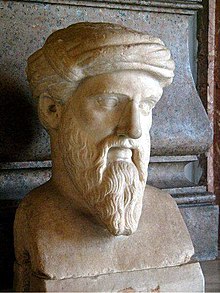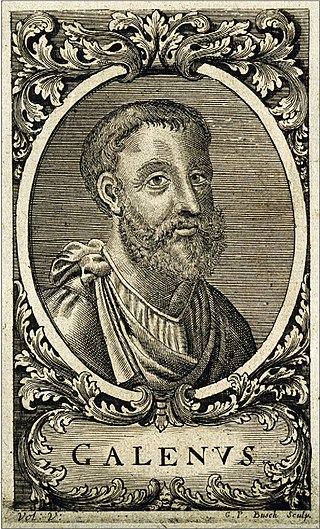
Aelius Galenus or Claudius Galenus, often anglicized as Galen or Galen of Pergamon, was a Roman and Greek physician, surgeon, and philosopher. Considered to be one of the most accomplished of all medical researchers of antiquity, Galen influenced the development of various scientific disciplines, including anatomy, physiology, pathology, pharmacology, and neurology, as well as philosophy and logic.
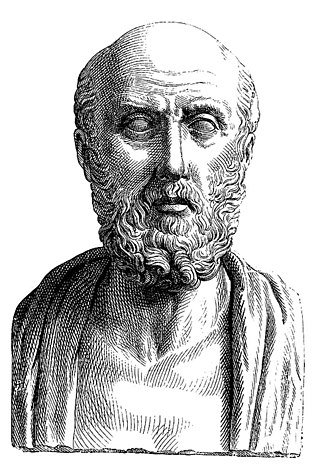
Hippocrates of Kos, also known as Hippocrates II, was a Greek physician and philosopher of the classical period who is considered one of the most outstanding figures in the history of medicine. He is traditionally referred to as the "Father of Medicine" in recognition of his lasting contributions to the field, such as the use of prognosis and clinical observation, the systematic categorization of diseases, and the formulation of humoral theory. The Hippocratic school of medicine revolutionized ancient Greek medicine, establishing it as a discipline distinct from other fields with which it had traditionally been associated, thus establishing medicine as a profession.
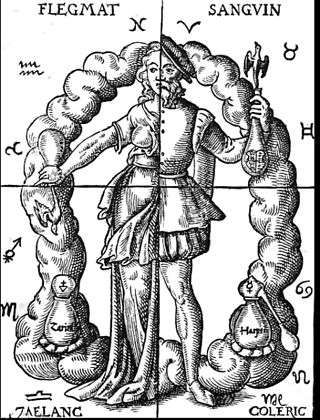
Humorism, the humoral theory, or humoralism, was a system of medicine detailing a supposed makeup and workings of the human body, adopted by Ancient Greek and Roman physicians and philosophers.
B vitamins are a class of water-soluble vitamins that play important roles in cell metabolism and synthesis of red blood cells. They are a chemically diverse class of compounds.

The Hippocratic Corpus, or Hippocratic Collection, is a collection of around 60 early Ancient Greek medical works strongly associated with the physician Hippocrates and his teachings. The Hippocratic Corpus covers many diverse aspects of medicine, from Hippocrates' medical theories to what he devised to be ethical means of medical practice, to addressing various illnesses. Even though it is considered a singular corpus that represents Hippocratic medicine, they vary in content, age, style, methods, and views practiced; therefore, authorship is largely unknown. The ancient commentaries on this corpus, from writers such as Attalion and Oribasius, are myriad. Hippocrates began Western society's development of medicine, through a delicate blending of the art of healing and scientific observations. What Hippocrates was sharing from within his collection of works was not only how to identify symptoms of disease and proper diagnostic practices, but more essentially, he was alluding to his personable form of art, "The art of true living and the art of fine medicine combined." The Hippocratic Corpus became the foundation upon which Western medical practice was built.

Science in classical antiquity encompasses inquiries into the workings of the world or universe aimed at both practical goals as well as more abstract investigations belonging to natural philosophy. Classical antiquity is traditionally defined as the period between the 8th century BC and the 6th century AD. It is typically limited geographically to the Greco-Roman West, Mediterranean basin, and Ancient Near East, thus excluding traditions of science in the ancient world in regions such as China and the Indian subcontinent.

Asclepiades, sometimes called Asclepiades of Bithynia or Asclepiades of Prusa, was a Greek physician born at Prusias-on-Sea in Bithynia in Anatolia and who flourished at Rome, where he practised and taught Greek medicine. He attempted to build a new theory of disease, based on the flow of "atoms" through pores in the body. His treatments sought to restore harmony through the use of diet, exercise, and bathing.
Diocles of Carystus was a well-regarded Greek physician, born in Carystus, a city on Euboea, Greece. His significance was as a major thinker, practitioner, and writer of the fourth century.

Helen King is a British classical scholar and advocate for the medical humanities. She is Professor Emerita of Classical Studies at the Open University. She was previously Professor of the History of Classical Medicine and Head of the Department of Classics at the University of Reading.
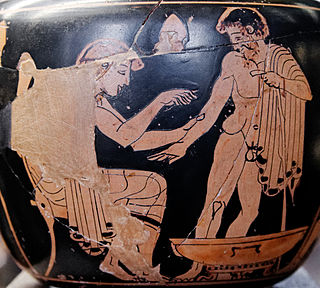
Ancient Greek medicine was a compilation of theories and practices that were constantly expanding through new ideologies and trials. The Greek term for medicine was iatrikē. Many components were considered in ancient Greek medicine, intertwining the spiritual with the physical. Specifically, the ancient Greeks believed health was affected by the humors, geographic location, social class, diet, trauma, beliefs, and mindset. Early on the ancient Greeks believed that illnesses were "divine punishments" and that healing was a "gift from the Gods". As trials continued wherein theories were tested against symptoms and results, the pure spiritual beliefs regarding "punishments" and "gifts" were replaced with a foundation based in the physical, i.e., cause and effect.

Medicine in ancient Rome was highly influenced by ancient Greek medicine, but also developed new practices through knowledge of the Hippocratic Corpus combined with use of the treatment of diet, regimen, along with surgical procedures. This was most notably seen through the works of two of the prominent Greek physicians, Dioscorides and Galen, who practiced medicine and recorded their discoveries. This is contrary to two other physicians like Soranus of Ephesus and Asclepiades of Bithynia, who practiced medicine both in outside territories and in ancient Roman territory, subsequently. Dioscorides was a Roman army physician, Soranus was a representative for the Methodic school of medicine, Galen performed public demonstrations, and Asclepiades was a leading Roman physician. These four physicians all had knowledge of medicine, ailments, and treatments that were healing, long lasting and influential to human history. Medicine in Ancient Rome was one of the most important influences to the modern medicine we have now.
Pneuma is an ancient Greek word for "breath", and in a religious context for "spirit". It has various technical meanings for medical writers and philosophers of classical antiquity, particularly in regard to physiology, and is also used in Greek translations of ruachרוח in the Hebrew Bible, and in the Greek New Testament.

Childbirth and obstetrics in classical antiquity were studied by the physicians of ancient Greece and Rome. Their ideas and practices during this time endured in Western medicine for centuries and many themes are seen in modern women's health. Classical gynecology and obstetrics were originally studied and taught mainly by midwives in the ancient world, but eventually scholarly physicians of both sexes became involved as well. Obstetrics is traditionally defined as the surgical specialty dealing with the care of a woman and her offspring during pregnancy, childbirth and the puerperium (recovery). Gynecology involves the medical practices dealing with the health of women's reproductive organs and breasts.
The Methodic school was a branch of medical thought in ancient Greece and Rome. It arose in reaction to both the Empiric school and the Dogmatic school. While the exact origins of the Methodic school are shrouded in some controversy, its doctrines are fairly well documented. Sextus Empiricus points to the school's common ground with Pyrrhonism, in that it “follow[s] the appearances and take[s] from these whatever seems expedient.”
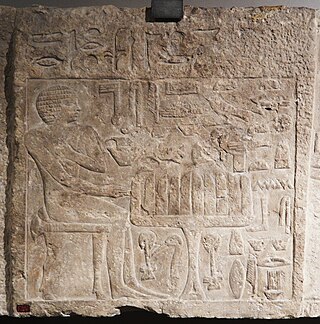
Bread was central to the formation of early human societies. From the Fertile Crescent, where wheat was domesticated, cultivation spread north and west, to Europe and North Africa, and east toward East Asia. This in turn led to the formation of towns, which curtailed nomadic lifestyles, and gave rise to other forms of societal organization. Similar developments occurred in the Americas with maize and in Asia with rice.
Peter David Arthur Garnsey, is a retired classicist and academic. Born in Australia, where he studied classics at the University of Sydney as a member of St Paul’s College, he has spent most of his career at Cambridge. He was a fellow of Jesus College, Cambridge from 1974 to 2006, and a professor of the history of classical antiquity at the University of Cambridge from 1997 to 2006. His area of research concerns the history of political theory, intellectual history, social and economic history, food, famine and nutrition, and physical anthropology.
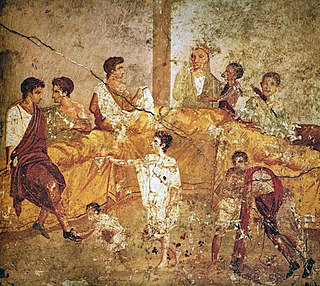
Food in ancient Rome reflects both the variety of food-stuffs available through the expanded trade networks of the Roman Empire and the traditions of conviviality from ancient Rome's earliest times, inherited in part from the Greeks and Etruscans. In contrast to the Greek symposium, which was primarily a drinking party, the equivalent social institution of the Roman convivium was focused on food. Banqueting played a major role in Rome's communal religion. Maintaining the food supply to the city of Rome had become a major political issue in the late Republic, and continued to be one of the main ways the emperor expressed his relationship to the Roman people and established his role as a benefactor. Roman food vendors and farmers' markets sold meats, fish, cheeses, produce, olive oil and spices; and pubs, bars, inns and food stalls sold prepared food.

Grape syrup is a condiment made with concentrated grape juice. It is thick and sweet because of its high ratio of sugar to water. Grape syrup is made by boiling grapes, removing their skins, and squeezing them through a sieve to extract the juice. Like other fruit syrups, a common use of grape syrup is as a topping to sweet cakes, such as pancakes or waffles.
Modern understanding of disease is very different from the way it was understood in ancient Greece and Rome. The way modern physicians approach healing of the sick differs greatly from the methods used by early general healers or elite physicians like Hippocrates or Galen. In modern medicine, the understanding of disease stems from the "germ theory of disease", a concept that emerged in the second half of the 19th century, such that a disease is the result of an invasion of a micro-organism into a living host. Therefore, when a person becomes ill, modern treatments "target" the specific pathogen or bacterium in order to "beat" or "kill" the disease.
Sophia Xenophontos is a Greek-Cypriot classicist and Senior Researcher at the Academy of Athens, and formerly an associate professor of Greek at Aristotle University of Thessaloniki. She is also affiliate scholar with the University of Glasgow, where she was previously lecturer in Classics and principal investigator and director of the Byzantine Aristotle project funded by the AHRC. Xenophontos is an external collaborator for the Commentaria in Aristotelem Graeca et Byzantina project and the founder and editor-in-chief of the book series ‘Theorising the Greek and Roman Classics’.

